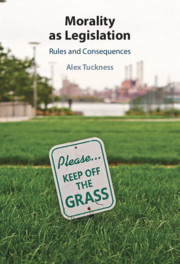Book contents
- Morality as Legislation
- Morality as Legislation
- Copyright page
- Dedication
- Contents
- Acknowledgments
- Abbreviations with Method of Citation
- Introduction
- Part I The Emergence of the Rule-Consequentialist Paradox
- Chapter 1 God and Consequences
- Chapter 2 Legislators, Architects, and Spectators
- Chapter 3 The Great Divide
- Chapter 4 Moral Expression as Legislation
- Chapter 5 Secular Heterodoxy
- Part II Contemporary Approaches to the Rule-Consequentialist Paradox
- Works Cited
- Index
Chapter 2 - Legislators, Architects, and Spectators
The Path to Hume
from Part I - The Emergence of the Rule-Consequentialist Paradox
Published online by Cambridge University Press: 29 July 2021
- Morality as Legislation
- Morality as Legislation
- Copyright page
- Dedication
- Contents
- Acknowledgments
- Abbreviations with Method of Citation
- Introduction
- Part I The Emergence of the Rule-Consequentialist Paradox
- Chapter 1 God and Consequences
- Chapter 2 Legislators, Architects, and Spectators
- Chapter 3 The Great Divide
- Chapter 4 Moral Expression as Legislation
- Chapter 5 Secular Heterodoxy
- Part II Contemporary Approaches to the Rule-Consequentialist Paradox
- Works Cited
- Index
Summary
In the time period from Berkeley to David Hume the architect and spectator metaphors were in competition with the legislative metaphor. Shaftesbury emphasized the architect metaphor where one assumes that God, the divine architect, has so designed human beings that we know what is right without relying upon the legislative paradigm. Human beings are endowed with a moral sense by the divine architect. Francis Hutcheson tried to synthesize the legislator and architect metaphors while adding that of the spectator. The perspective of the impartial spectator helps us determine what is right, avoiding personal bias or acting out of self-interest. Hume’s skepticism about the existence of divinely implanted moral sense led him to explain our sense of justice through a secular version of the spectator metaphor. Hume was very aware of the basic dilemma that adhering to the rules of justice in particular cases did not always produce the most good but that it was nonetheless important that people obey the rules of justice even in those cases. Hume sought to demonstrate what motivates people to act on rules that would be approved from the legislative perspective without recourse to divine intervention.
- Type
- Chapter
- Information
- Morality as LegislationRules and Consequences, pp. 58 - 82Publisher: Cambridge University PressPrint publication year: 2021

